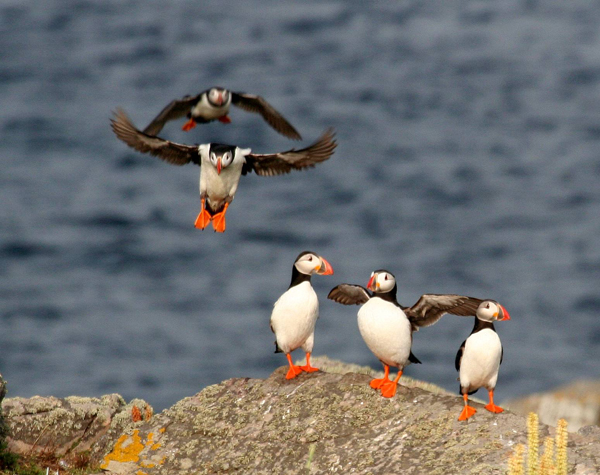Campaigners want a toxic glue, used in ships engines, to be reclassified
Sailors are being urged to ‘provide a huge environmental service’ by keeping an eye open for fouled birds.
More than 4,000 seabirds have been recorded washed up on beaches covered in the toxic glue polyisobutene (PIB) following two spillages along the English Channel this year.
The latest incident in April saw thousand stricken seabirds, including guillemots, puffins and razorbills, being washed
up dead or dying on shores across Devon, Cornwall and Dorset.
In May, the Royal Society for the Protection of Birds (RSPB) and other wildlife non-governmental organisations
(NGOs) joined the shipping industry to make a ground-breaking joint call for
review of PIB’s legal discharge status.
The call for PIB, used in ship’s engines, to be reclassified, coincided with the International Maritime Organisation (IMO)’s meeting of its environmental subcommittee.
It
would be a future meeting of this group that would discuss and
ultimately decide whether PIB should have a different hazard
classification status.
Petition to tell the government to act
At the moment PIB can be legally released into the sea under certain
conditions.
Although not directly toxic to seabirds, PIB becomes sticky
when it comes into contact with seawater, coating the plumage of
seabirds, restricting their movements and preventing them from feeding.
A petition, launched by campaign group 38 Degrees after the April spillage, is calling for transport
secretary Patrick McLoughlin MP to put pressure on the IMO to make it illegal for ships to dump PIB.
It has so far attracted 23,580 signatures.
Sailors have ‘a powerful voice’
Alderney Wildlife Trust manager Roland Gauvain says yachtsmen can play an important role by keeping ‘an eye open for fouled birds.’
He said: ‘With over 4,000 seabirds now dead or seriously injured in the western mouth of the Channel and with yet another potential PIB spill sighted in May, it is becoming vitally important to stop PIB from being discharged from ships before any more harm is done.
‘Boat owners have a powerful voice and can help to influence government to argue the case for change, but perhaps as importantly they are the eyes which could potential help to track down the origin of these discharges, which are befouling our waters.
‘It is vital that future discharges are caught early and rapid reporting of any form of pollution in the water to the MCA is a must.
‘Boaters can also provide a huge service by keeping an eye open for fouled birds.
‘Often the signs of fouling are far from obvious, however their behaviour may well tell you all you need to know.
‘If you encounter a bird failing to take flight or dive as you pass close by, then consider if this is normal in your experience and if it isn’t have a second look and please consider reporting it.’
Handy contacts
To contact the RSPB for birds and wildlife advice, call 01767 693690 (office hours).
Find out more about Alderney Wildlife Trust at www.alderneywildlife.org




